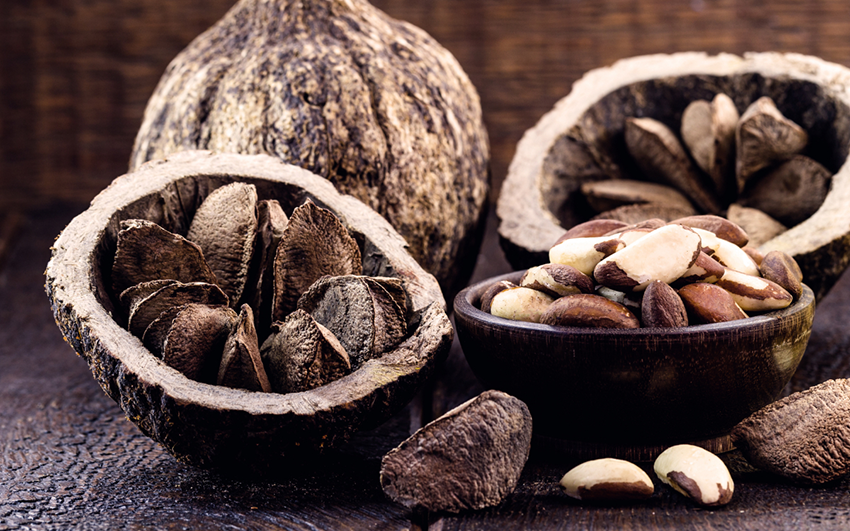Brazil Nuts: Nutritional Powerhouse from the Amazon Rainforest

Brazil nuts, scientifically known as Bertholletia excelsa, are one of the largest nuts in the world, growing in the dense Amazon rainforest of South America, primarily in Brazil, Bolivia, and Peru. Not only are they a nutritious snack, but they are also highly valued for their unique flavor and health benefits. Here’s an in-depth look at Brazil nuts, their nutritional benefits, environmental impact, and some practical ways to enjoy them.
Origins and Harvesting of Brazil Nuts
Brazil nuts grow on massive, towering trees that can reach up to 50 meters (160 feet) tall. These trees are native to the Amazon rainforest and are among the longest-living trees in the region, with some specimens over 500 years old. Brazil nut trees produce large, coconut-like pods containing 10–25 nuts encased in hard shells. The harvesting process is typically done by local communities who collect these pods once they naturally fall to the forest floor, making Brazil nuts one of the few wild-harvested products available on the market.
The reliance on natural pollinators and specific environmental conditions means that these nuts are challenging to cultivate commercially. This makes them a valuable resource for indigenous communities who gather, crack, and sell them to local and international markets.
Nutritional Profile of Brazil Nuts
Brazil nuts are highly nutritious and offer a host of health benefits. They are known for their high selenium content, a trace mineral crucial for various bodily functions. Just one Brazil nut can contain up to 96 micrograms of selenium, making it one of the richest sources available. Here’s a breakdown of some key nutrients in Brazil nuts:
- Selenium: A single Brazil nut can fulfill, and often exceed, the recommended daily intake of selenium, which is essential for thyroid function, immune support, and antioxidant protection.
- Healthy Fats: Rich in monounsaturated fats, Brazil nuts help promote heart health by reducing LDL cholesterol levels.
- Protein: Brazil nuts contain a substantial amount of protein, supporting muscle growth and repair.
- Vitamin E: This powerful antioxidant helps protect cells from damage and supports skin health.
- Magnesium, Zinc, and Copper: Essential minerals for various bodily functions, including bone health, immune system support, and red blood cell formation.
Brazil nuts are calorie-dense, with a single nut containing around 33 calories. This makes them an excellent snack option for quick energy but also means they should be eaten in moderation.
Health Benefits of Brazil Nuts
- Antioxidant Properties: The high selenium content in Brazil nuts provides antioxidant protection, helping to neutralize harmful free radicals and reduce inflammation.
- Thyroid Health: Selenium is necessary for the production and activation of thyroid hormones. Regular consumption of Brazil nuts can support proper thyroid function and overall hormonal balance.
- Heart Health: Brazil nuts are rich in heart-healthy fats and magnesium, which can help lower blood pressure and improve circulation.
- Brain Health: Selenium has been shown to play a role in cognitive function and may reduce the risk of neurodegenerative diseases when consumed as part of a balanced diet.
- Mood and Stress Support: Selenium deficiency has been linked to mood disorders and increased stress. Regular intake may help boost mood and reduce anxiety.
Environmental Impact and Sustainability
Brazil nut trees thrive in primary rainforests, where they rely on natural pollinators like bees to produce fruit. They play a unique role in forest conservation since the harvesting of these nuts often requires minimal environmental disruption. However, deforestation and changes in the Amazon’s ecosystem threaten Brazil nut trees. Efforts are being made to protect these trees and encourage sustainable harvesting practices, as they offer economic benefits for local communities and incentives to preserve the Amazon.
Supporting sustainable Brazil nut production by purchasing ethically sourced products helps preserve the rainforest and benefits indigenous and local communities who rely on Brazil nut harvesting as a source of income.
How to Enjoy Brazil Nuts
Here are a few delicious ways to incorporate Brazil nuts into your diet:
- Raw or Roasted: Brazil nuts can be eaten on their own as a nutrient-dense snack. Just a couple of nuts a day is enough to gain the benefits.
- Nut Butter: Brazil nut butter offers a creamy, rich spread that can be added to smoothies, toast, or used as a dip for fruits and vegetables.
- Granola and Trail Mixes: Add chopped Brazil nuts to granola or trail mixes for added flavor, texture, and a nutrient boost.
- In Desserts: Use ground Brazil nuts in baking, where they can add a mild, nutty flavor to cookies, brownies, and cakes.
- In Salads and Dishes: Sprinkle chopped or sliced Brazil nuts over salads, stir-fries, or grain bowls for extra crunch and nutrition.
Caution: Moderation is Key
While Brazil nuts are highly nutritious, their extremely high selenium content means that consuming too many can lead to selenium toxicity. Symptoms of excessive selenium intake include nausea, hair loss, and nail brittleness. Sticking to a recommended serving of one or two Brazil nuts per day is usually sufficient to gain all their health benefits safely.
Conclusion
Brazil nuts are a remarkable food, providing unique nutritional benefits and a delicious addition to a balanced diet. With their rich supply of selenium and heart-healthy fats, they support various aspects of health, from antioxidant protection to thyroid function. By choosing sustainably sourced Brazil nuts, consumers can also contribute to the preservation of the Amazon rainforest and support local communities.







